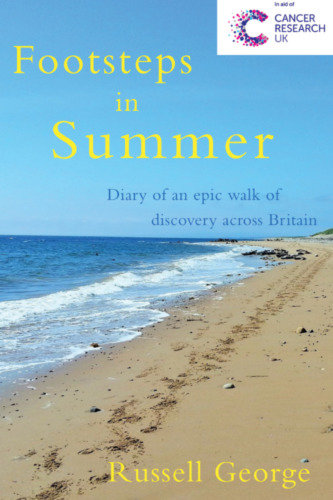
Russell George

Footsteps in Summer recounts the story of my 955 solo charity walk from John O’ Groats to Land’s End, which I completed in 2013. I’d taken early retirement and was eager to undertake a physical and mental challenge, which would also help me to raise funds for Cancer Research UK. I should point out without further delay that I was not a long distance walker – in fact this distance was about 930 miles further than I’d ever walked before!
I didn’t want the book just to be about a walk from A to B, so to broaden its appeal, I was keen to weave in stories about the people I met on the way and the places I passed through. In particular, I gradually discovered that my entire walking route was dotted with the scenes of tragic historical events, from transport and industrial disasters to natural catastrophes – this was quite remarkable as most of my route was rural. Don’t be put off by the dark side though – it’s an amusing read really!
How much did retiring early give you the opportunity to write?
Retiring early actually presented me with the opportunity to undertake the walk. The planning (route, accommodation and equipment), fundraising and personal training took several months, while the walk itself lasted nearly two months, so there’s no way this would have been possible whilst working.
As I like to be outdoors as much as possible, I deliberately wrote the book during the grey winter months. However, I soon discovered that writing about the walk quickly transported me back into the summer months and I was gratefully immersed in a re-run of the events which took place on my journey.
What made you decide to take on such a challenging walk to raise money for Cancer Research UK?
Most people expect me to have a personal cancer story to tell, but the reality is that I was inspired to raise funds for Cancer Research UK because of the amazing progress that their ground-breaking work has helped to make in increasing cancer survival rates. Within my lifetime, survival rates have increased from below 25% to 50%, and the bold target is to reach 75% within the next 20 years. What’s more, Cancer Research UK rely entirely on public donations and legacies.
I raised nearly £18,000 from the walk and, as all royalties from sales of Footsteps in Summer are also being donated, I hope to reach £25,000 this year.
What were your highs and lows along the way?
The lows all occurred in the first few days of the walk, when I developed a painful blister on my baby toe, which made walking uncomfortable and then I managed to trip over my own feet, falling awkwardly onto my hand and grazing the ends of my fingers badly. Coupled with a heavy rucksack and loneliness (during the first week I hardly saw a soul while I was walking), I wondered whether I would be able to continue.
Once the lows had been resolved and banished in Inverness, the rest of my journey was a constant wave of highs. These included wonderfully varied scenery, exceptionally fine British weather, excellent accommodation and meals, meeting lots of family and friends en route, and the endless kindness of complete strangers. Even Andy Murray winning Wimbledon as I arrived in my home city of Liverpool felt like a high!
What made you want to tell your story with this book?
During the walk I’d written a daily blog, which allowed my supporters to follow my progress along the length of Britain. It wasn’t until I’d finished the walk that I discovered just how many people had been reading the blog each day and that, for many, it had become a small part of their daily routine. Numerous friends and colleagues encouraged me to turn my walking adventure into a book so, somewhat reluctantly, I eventually followed their advice. Principally, I looked upon writing Footsteps in Summer as an opportunity to raise more money for Cancer Research UK, but I also secretly hoped that it might be read one day by my future grandchildren.
As well as raising awareness of the extraordinary work undertaken by Cancer Research UK, I wanted the book to inspire people to seek their own dreams. By grasping the opportunity and taking one step at a time (literally, in my case!), it’s amazing what a complete novice can achieve.
Tell us about the most memorable stranger you met along the way.
It was a swelteringly hot Saturday afternoon on the Offa’s Dyke footpath and my walking companion for the day and I had both exhausted our water supplies, so we consulted the map and decided to make a one mile detour to the nearest pub. When we arrived gasping for a drink, we were stunned to discover that the pub was closed! Just at that moment, a man appeared from a nearby house and immediately realised our predicament. Despite being complete strangers, he invited us into his garden to join his family for several refreshing drinks, offered us food (which we had to decline) and even made a generous donation to my charity. Thank you Derek!
Why did you appreciate the simpler life more after doing this?
When you are walking at 3 or 4 miles an hour, the pace of daily life inevitably slows down and you start to notice features of the landscape that would normally go unnoticed – buildings, signposts, hedgerows and wildlife. When your new ‘job’ is to transport yourself and your rucksack safely on foot over a distance of around 20 miles from one accommodation to the next each day, your priorities change and the important factors become the availability of food and drink, the weather forecast, and places to shelter. Immersed in this world for two months, you quickly forget the complex, fast-paced ways of city life.
What is next for you?
Long distance walking and writing are both very addictive, so I feel drawn towards another adventure which would combine the two. Watch this space…..

